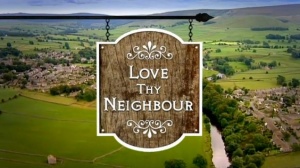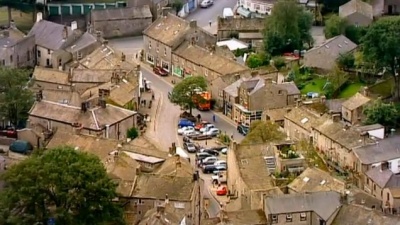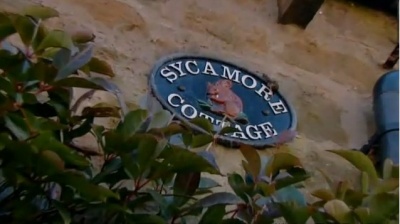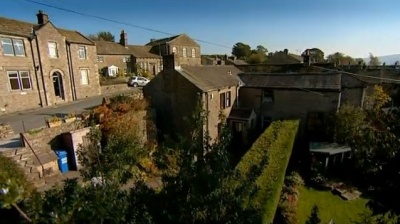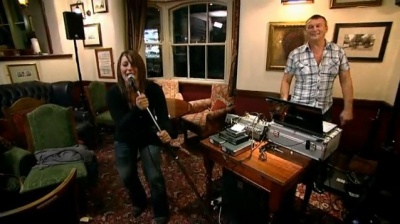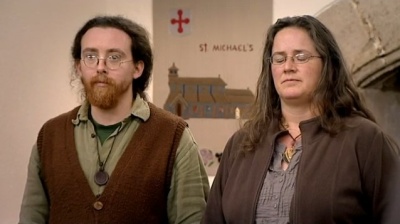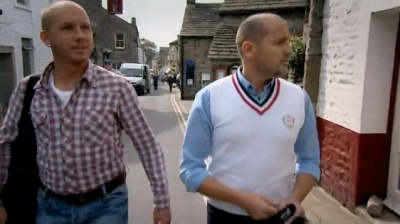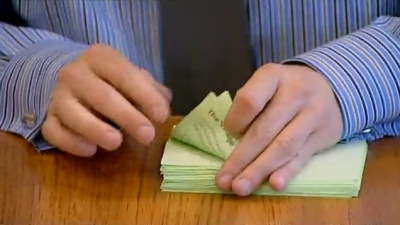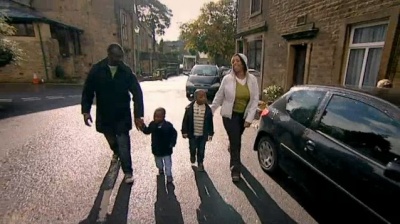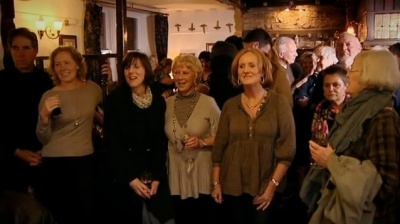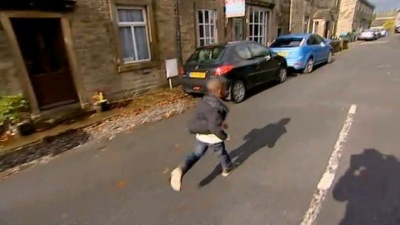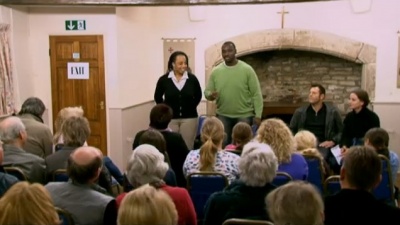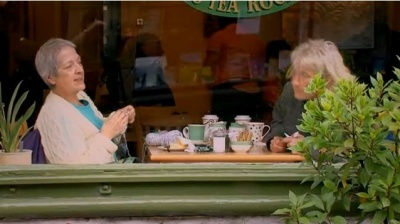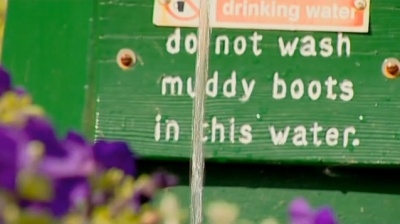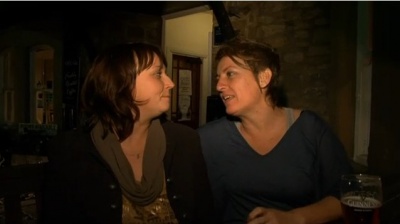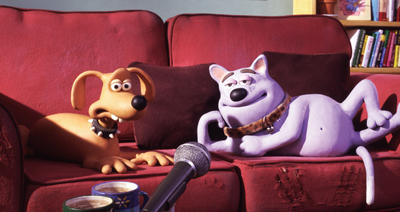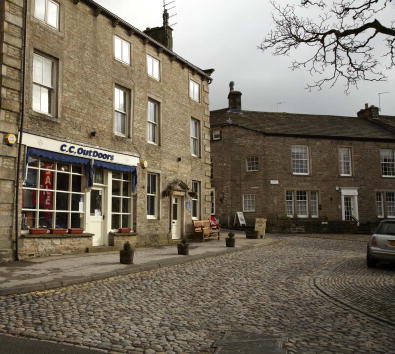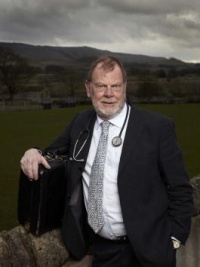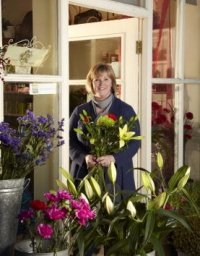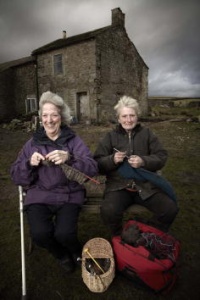Love Thy Neighbour
Contents |
Host
Voiceover: Richard Vranch
Broadcast
Studio Lambert for Channel 4/More4, 3 March to 15 April 2011 (8 episodes in 1 series)
(Transferred to More4 for last 4 episodes - see Trivia below)
Synopsis
We don't half end up watching some awful shows in our quest to document the entire game show genre. Take this, for instance - a chimera that's mostly shock-doc, but a shock-doc revolving around a competition. And not just a competition, but a competition with the most valuable prize awarded on Channel 4 since Chris Evans made someone a millionaire, back in the last century. All sold as a "reality" programme. Oh boy, are they asking for it.
Richard Vranch (what happened?) sets the scene with a question: "What if you could choose your neighbours?". Hmmm yes, you're right, that would be pretty awful. But why worry, it's not going to happen... oh wait, you're suggesting it would be a good thing? You're actually going to do it? Oh dear.
The place they're going to do it is Grassington, a reasonably attractive tourist trap in the Yorkshire Dales. Or as the voiceover puts it, "a well preserved corner of middle England". It looks like the sort of place that people on daytime TV are forever looking for houses in. And would you look at that, there's one up for grabs!
The only problem, if you believe the spin the programme puts on it, is that the people of Grassington don't like incomers. One villager (an incomer himself) says that you have to have three generations of ancestors in the graveyard before you're considered local. It's a funny line, but that's just what it is: a joke. That's not what the programme makers want you to think though. Their premise is that Grassington is insular, and not only insular but bigoted as well - until Studio Lambert come along in their messianic goodness to show the villagers the error of their ways, that is. "To attract new blood, we bought this £300,000 cottage as a prize", the voiceover informs us. Ooooh, how wonderful. We are not worthy to bask in the nimbus-glow of your public-spritedness.
So how does one go about winning this new life in the country? In each show, two families arrive in the village. They each get to spend two nights in the prize cottage, the other two nights in a B&B. They make speeches in a pub, each attempt to host an evening event, plus whatever else they choose to do on their own initiative, then they make final speeches before the existing residents get to vote for their favourites. The winners go through to the second round, from which two go on to the final. The formula for each episode is roughly:
1. Two lots of contestants arrive in the village.
2. The residents don't like the contestants because they are [some characteristic].
3. The contestants host a karaoke night / talent show / similar.
4. This makes the residents see the error of their ways.
5. Big dance number to finish.
Aren't Studio Lambert just super? They'll show those backward yokels what's what! Yeah, right.
Although the setting is Grassington, it could be anywhere. Really. It could have been Kettlethorpe in Lincolnshire, or Aberdour in Fife, both places where negotiations between producers and councillors were at an advanced stage before breaking down. It could have been any of the 500 other villages that executive producer Jamie Isaacs claims they looked at. It literally didn't matter where they ended up, the programme's thesis was always going to be the same, summed up in the question posed by the voiceover: "Can a traditional village embrace a very different kind of neighbour?".
This question patronises and belittles both the villagers and the contestants - after all, exactly who is labelling these people "a very different kind of neighbour"? It's constantly being implied that the villagers struggle to view the contestants as individuals, yet in truth it's the programme makers who are reducing the contestants to labels. You can go through the press release and count them off: lesbian, gay, black, new age traveller, single mum, transvestite... people chosen for and defined by the characteristic that the producers have decided will Shake Grassington To The Core.
And if Grassington reamins unshaken, they'll use every trick in the book to imply otherwise. Isaacs, series producer Chloe Court and their minions have set out to make a programme in which conservative country folk are made to face their prejudices, and by jingo that's the programme they're going to make, no matter what subterfuge they have to resort to. And on that subject two things strike us: how inept the makers are at stirring up conflict, and how adept they are at editing to cover this up.
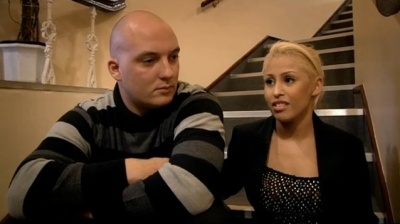 Andy and Vicky: Shaking Grassington To The Core by sitting on the stairs when there are perfectly good chairs available for that sort of thing
Andy and Vicky: Shaking Grassington To The Core by sitting on the stairs when there are perfectly good chairs available for that sort of thingTake the first episode (as broadcast - they're not in the order as filmed, so it was a deliberate choice to open with this one). Two families with children - Steve and Nicky from Birmingham, Phillip and Simone from London. Steve is a carpenter and builder, Phillip "works for a security company" (doing accounts, though we only know this from reading the press release) and is an aspiring Tory MP. Well, that's a foregone conclusion then - if an aspiring Conservative MP can't win a favour-currying competition in one of the safest Conservative seats in the country, he's clearly got the wrong ambition. We'll not keep you in suspense; it does indeed turn out to be a one-sided contest: the would-be MP and his family win by a margin of 2 to 1.
But wait! There's something that the good people of Studio Lambert would like you to be very much aware of: Phillip and Simone are black. Which, as the good people of Studio Lambert would also like to insinuate repeatedly, might be a problem, because hey, Grassington's sort of rural and the good people of Studio Lambert know what those unreconstructed yokels living as much as twenty minutes' drive from a large city are like.
Except... those dastardly Grassingtonians utterly fail to live down to the producers' expectations. The crew film for a week with the specific intention of exposing the racist attitudes of Kettlethorpe Aberdour whichever village it is they've finally descended upon, and they come up with nothing but the odd misunderstanding (one villager refers to them as "Jamaican", which is a weird mistake, but carrying no weight of judgement) and a few villagers expressing concern that other people might express racist attitudes. It's a pretty safe bet that there are a minority of racists in Grassington, just like anywhere else. (As one resident says, "you're always going to get one or two who have a problem".) But we are never shown any evidence that racism is common in Grassington, let alone accepted as normal.
While some residents may have been concerned for Phillip and Simone, in the end nobody really cared about their melanin levels. Except, that is, for the programme makers, who had decided that colour was An Issue (or rather, colour was The Issue) and went all-out to make sure we the viewers thought so too. A bewilderingly crass voiceover script insisted that that the couple were "conscious that they are different", that "for Phillip and Simone, blending into the village may not be easy", and, in a particularly jaw-dropping moment leading into a scene in which they were guests at a dinner party with most of the locals picked out by Studio Lambert to feature in the show,"they hope to persuade the guests that they have more in common than first meets the eye." Now that's trying to have it both ways: presenting pigmentation as their most important characteristic, while simultaneously suggesting that the villagers need to be persuaded that it isn't.
Playing the race card is only one element of the programme's claim - its central premise, indeed - that the people of Grassington are hostile to incomers. There's enough evidence on screen to demolish this one, if you read between the lines: many of the programme's "locals" (the ones that supposedly need three generations in the graveyard, remember?) have actually been welcomed as incomers themselves. Some mention it in the programme, others are revealed in the publicity material. They have relocated from Doncaster, Birmingham, Hampshire, Suffolk... all over, basically. Clearly Grassington has no trouble attracting newcomers, and newcomers have no trouble fitting in. If anything, the greater issue is younger people being forced out because of the rising cost of housing there. So, people of Studio Lambert, what the hell are you on about?
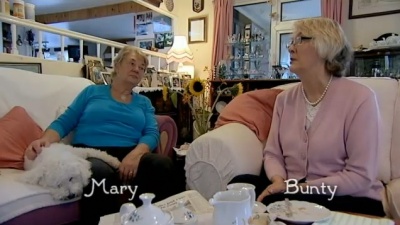 Mary (incomer), Bunty (lifelong resident), and a dog (slipped through a wormhole from another dimension)
Mary (incomer), Bunty (lifelong resident), and a dog (slipped through a wormhole from another dimension)And even when conflict does arise, what are we supposed to make of it? In the second episode a couple of people make genuinely homophobic comments, and one or two people take down one of the contestant's posters. But do they really speak or act for anyone other than themselves? The producers would like you to think so, but the evidence says otherwise. And even if their views were commonplace, would this tell us anything useful? Ah, now there's the rub. Because there's another implicit but fundamental assumption at work here: you wouldn't get this sort of thing in the city. Oh yes you would. Besides, isn't it rather two-faced to condemn conflict when it's you who contrived to stir it up in the first place?
What many of the Grassington residents are hostile to, and with good reason, is TV crews coming in to film a show with the intention of presenting a preconceived idea of village life regardless of the reality. The process of finding a village with enough residents willing to take part was a long one and even in Grassington, the number of willing participants seems barely quorate. Indeed, residents have reported that the turnout was so low in the first poll that the later ones were opened to people in neighbouring villages, and that one shot supposedly of people clamouring to vote was actually people going in to see a performance by the Grassington Singers, while another was of residents going into a knitting club meeting (actually, a suspiciously large number of residents are interviewed while knitting - it makes you wonder how the price for fleeces can be so low when the demand is apparently so high). Meanwhile, residents choosing not to take part are all grist to Studio Lambert's relentlessly grinding mill: rather than admit that many of the residents don't wish to take part (and rather than respect their wishes), the programme presents refusals to get involved as a personal snub against the contestants. Because they're [fill in label here].
It's not just residents who get stitched up either; one contestant was portrayed as so aloof that it appeared she didn't want to be there at all. Why would you cast a contestant who didn't want to win? We later found out that there had been serious medical problems in the family, such that going from the stress of that to the stress of long days filming would sap anyone's joie de vivre. There are ways of acknowledging this without resorting to the sob stories so derided in other reality shows, but there was no acknowledgement at all, either in the programme or in the publicity material (programme makers relying on the publicity material to fill in gaps is not ideal either - realistically, how many viewers are going to seek it out? - but at least it would put an explanation out there). You can debate how far producers' duty of care toward contestants goes, but placing a contestant under more pressure and then deliberately editing the footage to make her look bad, is clearly not best practice.
No game show has ever made us work so hard to learn the truth behind the "reality" presented on screen. The more one looks into the making of the programme, the more it seems that it's been filmed and edited with such a singleminded devotion to the pre-planned storyline that it emerges as perilously close to fiction. Why, for example, does the voiceover script express surprise at the contestants making it into the local paper? Not only is it unsurprising that a TV show would attract attention, it's particularly so given that the producers were feeding stories to the local press. Yes, Jamie Isaacs, we read the interview you gave to Broadcast in which you were practically gloating about your news management. But we can't have the viewers knowing that, can we?
Is there anything good about this programme? Well, we certainly did warm to some of the contributors, who are often self-deprecating and funny on the pleasures and drawbacks of village life - one reviewer described a particular pair of residents as "like something out of Creature Comforts", which is spot-on, but also a rather telling point of contrast. Because while Creature Comforts puts its words into the mouths of animals, it's still infused with a warmth and - oh yes - humanity lacking in this relentlessly sneering and mean-spirited show.
We've seen quite a number of popularity contests over the years, but usually they're in a controlled setting. "Love Thy Neighbour" is presented as being about the real world, but it's only about reality to the extent that it fits the show the producers want to make. As such, it's not actually about rural life, or Grassington, at all. It's not even really about people. It is about prejudice, but not about challenging the prejudice of people in Grassington, or of viewers; it's all about promoting the prejudices of the programme-makers. Programme makers who have decided the story they're going to tell and will tell it regardless of the reality, who reduce everyone - contestants, residents, even people who don't want anything to do with the show - to caricature, and worst of all seem to view real people not so much as unpaid actors in their production, more as props. And that stinks.
Trivia
Originally announced as The Village, and became The Outsiders after filming, before changing to the final title shortly before broadcast.
One observation we couldn't shoehorn in but wanted to make anyway is that somewhat surprisingly, those two institutions usually presented as being at the heart of stereotypical village life, the Church of England and the Women's Institute, are remarkably absent from this series. We would give the producers a little credit for not doing the obvious thing there, but we rather suspect it wasn't actually their decision.
After three episodes had gone out to less than stellar reviews and poor audiences (dropping below a million in overnights), Love Thy Neighbour was pre-empted for a special on the physics of the recent earthquake in Japan. This proved to be more popular with viewers, and the second half of the series was unceremoniously bundled out on digital channel More4 to even fewer viewers.
The foregoing does however mean that, on a technicality, the show now holds the record for the biggest prize ever awarded on More4. In fact, until Very Hard Questions, the only substantial prize ever awarded on More4.
Latterly, Grassington has enjoyed a happier association with another TV show: it "plays" the principal location of Darrowby in the Channel 5 remake of All Creatures Great & Small.
Champion
Andy Johnson and Vicky Allan
Merchandise
Creature Comforts on DVD - seriously, forget about "Love Thy Neighbour" and just stick this on instead. Or of course there's always All Creatures Great & Small. Nobody knew it but truly, Siegfried Farnon is the part Samuel West was born to play.
Web links
See also
Pictures
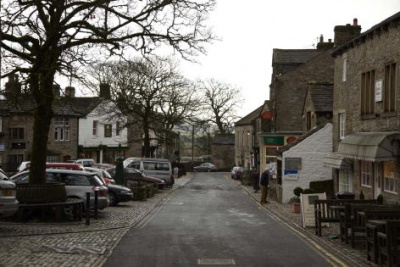 Come to Grassington! It's got.. er... some nondescript streets and a car park!
Come to Grassington! It's got.. er... some nondescript streets and a car park!(For ACG&S location-spotters, the Drovers Arms would be just out of shot on the right.)

